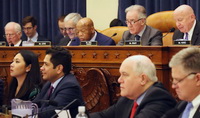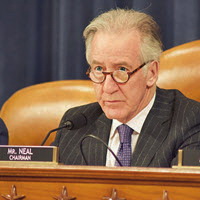The House Ways and Means Committee yesterday passed legislation to extend a host of expired and expiring tax credits through 2020 by a vote of 25-17. Among the bills advanced to the House floor for consideration is the Taxpayer Certainty and Disaster Tax Relief Act of 2019 (H.R. 3301), which includes a deduction for energy efficient commercial buildings (Section 179D). (House Ways and Means, Markup of Tax Legislation).
 |
The House Ways and Means Committee yesterday passed legislation to extend a host of expired and expiring tax credits through 2020, including several afecting real estate. |
- Committee Chairman Richard Neal (D-MA) said in his opening statement that extenders would provide "needed certainty for businesses making use of tax provisions that expired in 2017 and 2018, as well as some set to expire this year."
- In addition to the Section 179D tax deduction, H.R. 3301 and its Amendment in the Nature of a Substitute contain other provisions affecting real estate:
• Credit for construction of new energy efficient homes (sec. 45L)
• Credit for energy efficient improvements to principal residences (sec. 25C)
• Exclusion of mortgage debt forgiveness (sec. 108(a)(1)(E))
• Deductibility of mortgage insurance premiums (sec. 163(h)(3)(E))
• New markets tax credit (sec. 45D)
• Empowerment zone tax incentives (sec. 1391-97 )
In conjunction with the markup, the Joint Committee on Taxation (JCT) issued a report on the estimated revenue effects of H.R. 3301, concluding the extenders bill portion would cost $42.5 billion, which includes $9.3 billion in tax relief for disaster areas. (JCT technical description)
 |
Ways and Means Chairman Neal indicated he plans to hold a Committee vote on a technical corrections bill later in the year. |
- The Democrats' bill would accelerate expiration of the increase in the estate tax exemption that was included in the Tax Cuts and Jobs Act (TCJA). TCJA doubled the estate tax exemption from $5.7 million to $11.4 million (indexed for inflation). Under current law, the temporary increase expires at the end of 2025. In order to pay for the tax extender legislation, the bill accelerates expiration of the estate tax exemption increase to the end of 2022.
- Several Republicans expressed concerns over continuing to pass tax "extenders" legislation without looking for long-term solutions to reform, make permanent, or repeal the various provisions. Chairman Richard Neal (D-MA) said he is willing to consider any suggested reforms at a later stage. (BGov, June 20)
- In response to an unsuccessful Republican amendment that would have made a number of technical corrections to TCJA, including a much-needed reduction in the cost recovery period for qualified improvement property, Chairman Neal indicated he plans to hold a Committee vote on a technical corrections bill later in the year.
The Democratic extender bill is widely viewed as an initial negotiating position for talks with Senate Republicans. Additional changes may be made as the bill goes to the House floor. In the Senate, Finance Committee Chairman Chuck Grassley (R-IA) and Ranking Member Ron Wyden (D-OR) in May announced the formation of several bipartisan taskforces to examine and help permanently resolve the fate of more than 30 expired and expiring tax provisions. (Senate Finance Committee
Announcement , May 16 and
Roundtable Weekly , May 17)

